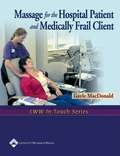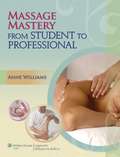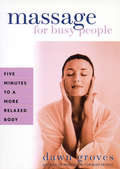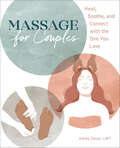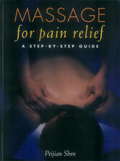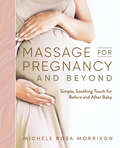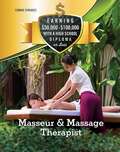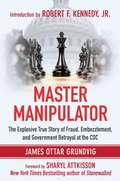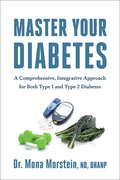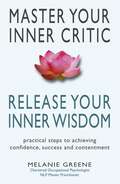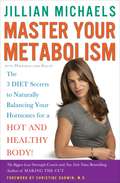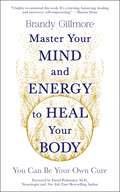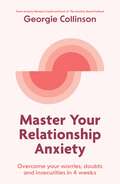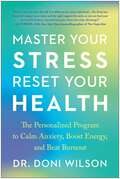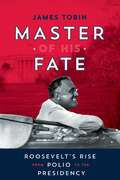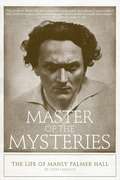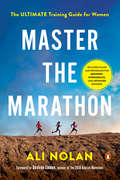- Table View
- List View
Massage For The Hospital Patient And Medically Frail Client
by Gayle MacdonaldThis is an essential, one-of-a-kind resource for gaining the skills and knowledge you need to provide safe, effective massage therapy to patients in acute care settings and private practice clients who are medically frail. As demand grows for massage therapy in acute care, many bodyworkers seek to broaden their ability to meet this important need. To paraphrase the author: For many touch therapists, massage is more than a job or a profession--it's a calling. With the knowledge gained from this expertly written book, you will be able to confidently provide massage therapy in the hospital, other care settings, and for clients affected by health problems. It's the ideal guide for student bodyworkers and practitioners, educators, hospital administrators, and a wide range of medical professionals.
Massage Mastery: From Student To Professional
by Anne WilliamsThis comprehensive introductory massage text is organized into 24 chapters that cover the key areas addressed in massage programs of 500 to 1200 hours in length. Topics inside the chapters are structured to allow for manageable reading assignments that build a student's sense of accomplishment and motivation. Written and designed for today's adult learner, the book offers a broad discussion of foundation massage with appropriate depth for a beginning student progressing to an entry-level professional. It also contains new topics that are necessary to prepare today's adult learners for successful massage careers. (Note: It does not cover anatomy and physiology, as A&P is best thoroughly covered in a separate textbook. ) A helpful appendix on health care terminology, a comprehensive massage glossary, and a robust set of ancillary materials complete the package. The companion Study Guide contains topic-specific Rubrics, Learning Contracts, and a variety of exercises and activities for students.
Massage Test Prep - Complete Study Guide For MBLEx, Fourth Edition
by David MerlinoNew for 2016, the Fourth Edition of Massage Test Prep's Complete Study Guide for MBLEx! Not only does Massage Test Prep offer the BEST, most current study guide to date, it offers the most quality of ANY MBLEx study guide.
Massage Therapy: Principles and Practice
by Susan SalvoCovering massage fundamentals, techniques, and anatomy and physiology, Susan Salvo's Massage Therapy: Principles and Practice, 5th Edition brings a whole new meaning to the word 'comprehensive. ' This student-friendly text boasts expanded sections on neuroscience, research, and special populations. It makes the essential principles of massage therapy more approachable and prepares you for success in class, on licensing and board certification exams, and in a wide range of therapeutic practice settings. Clear, straightforward approach simplifies complex content for easier understanding. Complete anatomy and physiology section, in addition to material on techniques and foundations, gives you all the information you need in just one book. Certification Practice Exam on Evolve mimics the major certification exams in format and content, builds confidence, and helps increase pass rates. Case studies challenge you to think critically and apply your understanding to realistic scenarios, foster open-mindedness, and stimulate dialogue. Profile boxes provide an inspirational, real-world perspective on massage practice from some of the most respected authorities in massage and bodywork. Clinical Massage chapter focuses on massage in clinical settings like hospitals, nursing homes, and medical offices to broaden your career potential. Two business chapters loaded with skills to make you more marketable and better prepared for today's competitive job market.
Massage for Busy People
by Dawn GrovesDo you feel stressed, tired, depleted? Do you hold tension in certain parts of your body because of your busy lifestyle -- or extended time in one position, such as working at your computer or sitting in a car commuting? Muscle pain, back spasm, and a host of anxiety-related disorders seem inevitable in today's overproductive world. However, there's a simple way to rebuild and counteract the damage inflicted by this grueling lifestyle: self-massage. With clear instructions and 30 photographs, this books describes various types of self-massage techniques for relieving stress and relaxing. By learning about intention and focus, timing, practice, and a "balanced" approach, you can maximize the benefits of quick massage and create a personal massage routine tailored to the demands of your world...in just a few minutes a day. You'll learn to: strengthen your posture, diminish aches and pains, replenish your energy, and target specific conditions such as headaches or stiff neck. In a practical and inspiring way, Massage for Busy People takes the practice of massage and personalizes it for all environments -- at home, at the office, in the car, or on a plane.
Massage for Couples: Heal, Soothe, and Connect with the One You Love
by Ashley DwyerDiscover a deeper connection with your partner through the healing power of massageThere's nothing like the stress-relieving, mood-lifting comfort of physical touch to bring out the best in your relationship. Whether you are helping a partner with aches and pains or looking to foster intimacy, Massage for Couples will teach you time-honored techniques from around the world that have made massage a staple for relaxation and relationship longevity since ancient times.Begin by gaining confidence in using your hands to provide a healing touch. Then discover guided massage sequences to soothe, inspire, uplift, relax, or resolve a specific pain point. Support your partner's well-being and enjoy a healthy, enriching way to spend quality time together.Inside Massage for Couples, you'll find:Naturally healing together—Practice a holistic method of experiencing pleasure and providing relief from stress and fatigue.Body wisdom—Educate yourself on some light biology and anatomy lessons that will help you refine your skills and give truly transformative, bliss-inspiring massages.Comfort and connection—Master instructions for resolving specific aches and pains as well as tips for connecting with a partner emotionally.Learn the healing power of touch to promote wellness and heighten intimacy with Massage for Couples.
Massage for Pain Relief
by Peijian ShenThis fully illustrated, step-by-step guide to simple pain relief covers everything from headaches to back pain to tennis elbow, all using Oriental massage and pressure techniques. Full-color illustrations and diagrams throughout.From the Trade Paperback edition.
Massage for Pregnancy and Beyond: Simple, Soothing Touch for Before and After Baby
by Michele Rosa MorrisonSoothing massage to support a mother before, during, and after birth Pregnancy is an exciting and challenging time, and expectant mothers need all the physical and emotional support they can get. A massage from a partner or loved one can be a beautiful way to offer that support. Massage for Pregnancy and Beyond is your how-to guide for safe and comforting massage techniques that can be used by anyone looking to do something helpful and healing for a mom-to-be. You'll learn the basics of effective massage therapy, including simple sequences to relieve everything from sore feet and hip tension to supporting a woman through the remarkable event that is birth. Massage for Pregnancy and Beyond features: Advice for the entire journey—Understand the changes mom's body is undergoing during each trimester of pregnancy, as well as labor and the postpartum phase. No experience required—Simple instructions ensure you can easily learn techniques to soothe, calm, and support a pregnant loved one. A closer connection—Discover the beauty of healing touch to provide comfort, safety, and bonding for mom, baby, and partners. Learn how pregnancy massage can help loved ones connect on the journey of bringing a new life into the world.
Massage: Meer dan gewoon wat wrijven (Hoe moet je... #124)
by Owen JonesMassage Meer dan gewoon wat wrijven Hallo en bedankt om het e-boek ‘Massage’ te kopen. Ik hoop dat je deze informatie als nuttig, handig en winstgevend zal beschouwen. De informatie in dit e-boek, over allerlei aspecten van massagetechnieken, -stijlen en verwante onderwerpen, is opgebouwd uit 15 hoofdstukken van ongeveer 500-600 woorden elk. Ik hoop dat dit interesssant zal zijn voor mensen die weten te genieten van een goede massage of voor zij die ervan dromen om deel uit te maken van de groeiende sector die massage is. Als extra bonus geef ik je toestemming om de inhoud te gebruiken voor je eigen websites of blogs en nieuwsbrieven, hoewel het beter is om het eerst zelf in je eigen woorden te herschrijven. Je mag het boek ook opsplitsen en de artikels verkopen. Het enige recht dat je in feite niet hebt is om het volledige boek door te verkopen. Gelieve alle feedback te richten naar het bedrijf waar je dit boek hebt gekocht. Je zal daar ook meer boeken zoals dit vinden. Nogmaals bedankt om dit e-boek te kopen, Gegroet, Owen Jones
Massagem: Mais do que apenas uma boa massagem (Como fazer... #124)
by Owen JonesMassagem Mais do que apenas uma boa massagem Olá e obrigado por comprar este ebook chamado "Massagem". Espero que você ache as informações prestativas, úteis e lucrativas. As informações contidas neste e-book sobre vários aspectos das técnicas de massagem, estilos e assuntos relacionados estão organizadas em 15 capítulos com cerca de 500 a 600 palavras cada. Espero que seja do interesse de quem gosta de uma massagem ou gostaria de entrar no sector de massagens em expansão. Como um bónus adicional, concedo-lhe a permissão para usar o conteúdo no seu próprio site ou nos seus próprios blogs e newsleters, embora seja melhor se antes você os reescrever com as suas próprias palavras. Você também pode dividir o livro e revender os artigos. De facto, o único direito que você não tem é revender ou doar o livro como ele lhe foi entregue. Se você tiver algum comentário, deixe-o na empresa onde você comprou este livro. Você também encontrará mais livros como este por lá. Agradecemos novamente por adquirir este ebook, Saudações, Owen Jones
Masseur & Massage Therapist (Earning $50,000 - $100,000 with a High S)
by Connor SyrewiczFor many high school graduates, college is a way to get ahead, but going to college is not the only way for young adults to succeed. Many people choose to enter the workforce after high school to start earning money and gaining experience right away. These motivated young workers can have rewarding jobs without ever having to earn a 4-year college degree. If you're interested in making others feel good and don't know that you want to--or can--go to college, a career in massage therapy might be for you. Young people need only a high school diploma or equivalent to start in massage, and they can eventually earn more than $50,000 a year. In Masseurs & Massage Therapists, you'll learn how to start a career in massage therapy and what you need to succeed in the field. Find out about the prospects for massage careers in the future, how much masseurs can make each year, and whether your path to success includes a career as a masseur or massage therapist.
Master Manipulator: The Explosive True Story of Fraud, Embezzlement, and Government Betrayal at the CDC
by Robert F. Kennedy Jr. Sharyl Attkisson James Ottar GrundvigThe explosive true story of fraud, embezzlement, and government betrayal. In 2000, the US Centers for Disease Control (CDC) carried out a secret mission to bury, skew, and manipulate data in six vaccine safety studies, in a coordinated effort to control the message that "vaccines do not cause autism.” They did so via secret meetings and backtesting health-care data. The CDC invested tens of millions of dollars in a foreign health-care data analytics startup run by Danish scientist Poul Thorsen, a move to ensure that no link ever surfaced. But fate had other ideas. The agency soon learned it couldn’t control Thorsen. In 2011, the US Justice Department indicted him for the theft of more than $1 million of CDC grant money.Master Manipulator exposes the CDC’s hidden agenda for the cover-up. Influenced by Big Pharma money, future high-paying jobs, and political lobbyists, CDC executives charted a course different than what the findings of earlier vaccine safety studies revealed. The CDC needed an outsider to "flatten” the results of the data, while building an exit strategy: a fall guy in case the secret plan was exposed. Thorsen fit the bill nicely, conducting studies overseas. But the CDC’s plan backfired, as Thorsen took the money to the bank and the power went to his head. It would take years for his fraud scheme funneling CDC grant money to a Danish university and then back to a CDC bank account he controlled to play out.Master Manipulator is a true story of fraud and betrayal, and an insider’s view of what takes place behind the closed doors of agencies and drug companies, and with the people tasked to protect the health of American children. It’s a cautionary tale of the dangers of blind trust in the government and the health-care industry.
Master Recipes from the Herbal Apothecary: 375 Tinctures, Salves, Teas, Capsules, Oils, and Washes for Whole-Body Health and Wellness
by JJ Pursell“This incredible, in-depth, and easy-to-access resource is a must for all of us who wish to learn more about healing ourselves through the plant world.” —Shiva Rose, actress, activist, and founder of The Local Rose JJ Pursell, the bestselling author of The Herbal Apothecary, is back with a complete, one-stop resource for herbal remedies that heal and nurture the whole family. Master Recipes from the Herbal Apothecary offers safe, trusted natural remedies written by a board-certified naturopathic physician. It starts with master recipes for tinctures, salves, teas, capsules, oils, washes, and more. Once you understand how to make these basic formulations, you can access the more than 375 specific recipes that address a range of health concerns from the common cold and headaches to insomnia and digestive issues. Comprehensive, thoroughly researched, and beautifully packaged, Master Recipes from the Herbal Apothecary will become your go-to guide for sustained health and wellness.
Master Your Diabetes: A Comprehensive, Integrative Approach for Both Type 1 and Type 2 Diabetes
by Mona Morstein&“Dr. Morstein draws from the best of conventional and integrative therapies to provide diabetic patients an easy-to-implement program to regain their health.&”—Robb Wolf, author of Wired to EatThe evidence is clear: We are in the midst of a worldwide diabetes epidemic. In the United States alone, one in three Americans is either diabetic (29 million patients) or prediabetic (87 million patients), costing an annual $242 billion in medical treatments.In Master Your Diabetes, naturopathic physician and diabetes expert Dr. Mona Morstein shows how people with both type 1 and type 2 diabetes can gain and maintain excellent control of their blood sugar levels, preventing and even reversing existing complications through education combined with medical support and encouragement. This is the first comprehensive guide for patients, caregivers, and medical practitioners to demonstrate an integrative approach based on the &“eight essentials&” of treatment and prevention: a low-carb diet, exercise, good sleep, stress management, healing the gut, detoxification, supplementation, and medications.Topics covered include:Important physical exams and lab workConventional diets and non-insulin medicationsInsulinLow-carb diets and how they apply to different food groupsLifestyle factors, including exercise, stress management, and the microbiomeDiabetic supplementationPediatric diabetesAn indispensable resource, Master Your Diabetes will empower readers to take control of their condition and continue living full, active, enjoyable, and long lives.
Master Your Inner Critic: Release Your Inner Wisdom
by Melanie GreeneEveryone has messages running through their head but for many people the messages are negative and self-critical. This is the first book to provide a range of tried and tested techniques for transforming your inner critic. By using these techniques you can transform your thoughts, feelings and behaviour to become a happier person.
Master Your Inner Critic: Release Your Inner Wisdom
by Melanie GreeneEveryone has messages running through their head but for many people the messages are negative and self-critical. This is the first book to provide a range of tried and tested techniques for transforming your inner critic. By using these techniques you can transform your thoughts, feelings and behaviour to become a happier person.
Master Your Metabolism: The 3 Diet Secrets to Naturally Balancing Your Hormones for a Hot and Healthy Body!
by Jillian Michaels Mariska Van AalstDoes it feel as if you’re fighting your body to lose even one pound—or just to maintain your current weight? Respected health and wellness expert and bestselling author Jillian Michaels has been there, too. So she consulted top experts in the field of metabolism and discovered that she’d inadvertently been abusing her endocrine system for years. After “fixing” her own metabolism, she decided to share what she learned by devising this simple, 3-phase plan that engages all the weight-loss hormones (including the friendly HGH, testosterone, DHEA; and the not-so-friendly: insulin, cortisol, and excess estrogen). In Master Your Metabolism, discover how to:•REMOVE “anti-nutrients” from your diet•RESTORE foods that speak directly to fat-burning genes •REBALANCE energy and your hormones for effortless weight lossMichaels offers a wealth of information throughout, including: shopping lists and online shopping resources, hormone-trigger food charts, how to eat “power nutrient” foods on a budget, smart strategies for eating out, quick and easy recipes, as well as mini-programs for addressing PMS, andropause, metabolic syndrome, PCOS, and menopause.From the Hardcover edition.
Master Your Mind and Energy to Heal Your Body: You Can Be Your Own Cure
by Brandy GillmoreAMAZON #1 BESTSELLERA captivating must-read, this book unveils the astounding hidden potential of the human mind. If you are interested in alternative healing, or if you have been struggling for years with your own recovery, then you will not want to miss this book.Brandy Gillmore reveals the groundbreaking research that enabled her to heal herself from a debilitating condition deemed incurable. Since then, Brandy has been able to show others how to heal themselves from a wide range of pain and illnesses and has also demonstrated mind-body healing using medical equipment. Due to unprecedented results, Brandy's work has been featured in several documentaries and docuseries. Now, for the first time, Brandy shares her research through this remarkable book so that you too can unlock the boundless potential of your own mind.In Part One, this book takes you on an extraordinary journey of discovery. Starting Brandy's accident and the disheartening news from her doctors that there was nothing anyone could do for her, it moves onto Brandy's desperate quest to find a cure, and all evidence continued to point to the mind as holding the ability to activate the body's innate self-healing mechanism. However, despite the evidence, Brandy was still skeptical. She had already tried practices like "mind over matter" meditation, and the power of belief, but none of them worked to heal her body. Furthermore, given the severity of Brandy's condition, it seemed impossible to her that her mind could heal her physical body.As Brandy delved further into medical research, she was astonished by her findings. Not only did she uncover concealed studies that vividly illustrated the mind's potential to impact on our physical body, but she also discovered scientifically documented information about the body's energy that challenged her preconceived notions about health.For example: - Did you know that people with multiple personalities can experience different illnesses in different personalities? For example, one personality may have back pain, while another may have asthma. Medical research has even documented a case of a woman who was blind in certain personalities but had normal vision in others.- Did you know that "energy" in the body is not a spiritual concept but has actually been medically documented? In fact, the medical scientist who first documented energy in the body (biophotons) in the 1920s was nominated for a Nobel Prize eleven times!As Brandy continued to explore each medical anomaly, from the placebo effect to spontaneous remission and everything in between, she was able to uncover even more obscure research and gain clarity as to what she needed to do to activate her body's self-healing mechanisms. That's when she began creating a step-by-step process. Over the years, this process has further evolved. Brandy now calls it the "GIFT method" because, as the name suggests, when we connect with our own innate ability to heal ourselves, it truly becomes a life-changing gift.In Part Two, Brandy shares this incredible step-by-step method, along with inspiring stories of individuals who have used this process of mind-body-energy healing to transform their lives and achieve self-healing. It is truly incredible what we are all capable of.
Master Your Mind and Energy to Heal Your Body: You Can Be Your Own Cure
by Brandy GillmoreAMAZON #1 BESTSELLERWhat if you could learn how to heal your injuries, pain, or illness using only the power of your mind?"This is essential reading for both those receiving care as well as those who provide it."-David Perlmutter, M.D., neurologist and New York Times best-selling author"I highly recommend this book. It is empowering and has the ability to transform the way the world sees health and healing."-Jack Canfield, co-author of the Chicken Soup for the Soul® series and The Success Principles™A captivating must-read, this book unveils the astounding hidden power of the human mind. If you are working on self-healing, or if you have been struggling for years with your own recovery, then you will not want to miss this book.After an unexpected event, Brandy Gillmore found herself disabled and desperately searching for answers to heal. She tried every healing approach she could find, including special diets, supplements, meditation, and everything in between, but to no avail. It wasn't until Brandy delved deeper into the workings of the mind that she discovered obscure research that helped her unlock the mystery of the body's innate healing ability, resulting in her full recovery and a profound transformation in her life.Since uncovering these remarkable findings, Brandy has gained recognition for helping others heal themselves, even from extreme illness. She has also demonstrated how to alleviate chronic pain within minutes and documented these results using medical thermal imaging equipment.In this groundbreaking book, you will...· Gain a revolutionary understanding of the body's ability to heal itself· Learn the key factors to activate healing (the 5 Factors for GIFT Mind-Body Healing™)· Implement a step-by-step process with powerful tools and techniques that can help you heal and free yourself from mental, emotional, and physical painBrandy's journey from having a debilitating incurable condition to complete recovery is more than inspirational; it can be seen as a blueprint for anyone facing seemingly insurmountable health challenges.Throughout history, for thousands of years, spiritual teachings have documented the mind's remarkable ability to heal. Furthermore, there is medically documented proof that our minds can impact our health in a variety of different ways, such as research on stress or the placebo. This book takes these well-known concepts to an entirely new level to help you understand how to tap into your body's own innate ability to heal itself.Written from a deep sense of mission and love, Master Your Mind to Heal Your Body has the ability to change your world by showing you how to harness the greatest gift you have - the power of your mind - to heal your body and improve the quality of your life.Get started today and learn how you can be your own cure!
Master Your Relationship Anxiety: Overcome your worries, doubts and insecurities in 4 weeks
by Georgie CollinsonWhy am I feeling anxious in love, and what is this anxiety trying to tell me?Feel calmer, more trusting and more confident in your relationships.Master Your Relationship Anxiety delivers a simple four-week program for overcoming the mental and emotional stresses that can stop us being our best selves in relationships. Exploring the four types of relationship anxiety, this book provides holistic, practical and highly relatable advice to help you feel better able to love others and create the deeper connections we all crave. You'll find valuable personal growth hidden in the anxiety, worry, insecurity and doubt that relationships inevitably bring to the surface. Once you've mastered how to be calm and open in love, you can experience living life with an open heart -- the ultimate antidote to all our fears and anxiety.
Master Your Relationship Anxiety: Overcome your worries, doubts and insecurities in 4 weeks
by Georgie CollinsonWhy am I feeling anxious in love, and what is this anxiety trying to tell me?Feel calmer, more trusting and more confident in your relationships.Master Your Relationship Anxiety delivers a simple four-week program for overcoming the mental and emotional stresses that can stop us being our best selves in relationships. Exploring the four types of relationship anxiety, this book provides holistic, practical and highly relatable advice to help you feel better able to love others and create the deeper connections we all crave. You'll find valuable personal growth hidden in the anxiety, worry, insecurity and doubt that relationships inevitably bring to the surface. Once you've mastered how to be calm and open in love, you can experience living life with an open heart -- the ultimate antidote to all our fears and anxiety.
Master Your Stress, Reset Your Health: The Personalized Program to Calm Anxiety, Boost Energy, and Beat Burnout
by Doni WilsonLearn to manage stress and overcome anxiety with this customizable breakthrough program from leading adrenal distress/stress expert Dr. Doni Wilson. We have come to accept stress and anxiety as being hand-in-glove with being successful. Many of us believe that we are supposed to be superhumans and just ignore stress—carrying on with long hours and sleepless nights, suffering quietly with the headaches, tension, and stomach sensitivity, rather than risk being perceived as unable to &“keep up&” with the demands of modern life. But we&’re not robots or machines; we&’re human. While stress is inevitable, and, in certain situations, even necessary for effective functioning, we must keep it from overpowering our daily lives by learning how to harness stress to empower us. In Master Your Stress, Reset Your Health, Dr. Doni Wilson shows that the key to breaking the cycle is finding and treating your unique stress type. After more than 20 years working with thousands of patients, Dr. Doni has found that people generally fall into one of five types based on their adrenaline and cortisol levels throughout the day: the Night Owl, the Stress Magnet, Yawning on the Go, Tired and Wired, or Sluggish and Stressed. In this groundbreaking book, she'll help you identify your stress type--and give you the tools to make stress work for you. Your body&’s particular response is based on genetics and your lifestyle. Your pattern is unique—even in similar situations, different people may respond to that stress in a completely different way. Dr. Doni&’s customizable C.A.R.E. program is simple: Clean eating, Adequate sleep, Recovery, and Exercise. Dr. Doni shows you how to tailor each step of the program for your stress type to allow you to: Overcome exhaustion and fatigue Clear up brain fog and improve memory Optimize your body weight Stop insomnia Recover from anxiety and depression Relieve headaches, chronic pain, and digestive issues Increase your energy, sex drive, and immunity Prevent serious illnesses such as cancer, dementia, and heart disease Add years to your life Far too many of us have accepted the negative effects of stress and anxiety as a fact of life—pushing through rather than risking falling short of the demands of modern life. This groundbreaking guide will set you on a path to become resilient to stress, so you can thrive like never before.
Master of His Fate: Roosevelt's Rise from Polio to the Presidency
by James TobinMaster of His Fate by James Tobin is an inspiring middle-grade biography of Franklin Delano Roosevelt, with a focus on his battle with polio and how his disease set him on the course to become president.In 1921, FDR contracted polio. Just as he began to set his sights on the New York governorship—and, with great hope, the presidency—FDR became paralyzed from the waist down. FDR faced a radical choice: give up politics or reenter the arena with a disability, something never seen before. With the help of Eleanor and close friends, Roosevelt made valiant strides toward rehabilitation and became even more focused on becoming president, proving that misfortune sometimes turns out to be a portal to unexpected opportunities and rewards—even to greatness. This groundbreaking political biography richly weaves together medicine, disability narratives, and presidential history.Christy Ottaviano Books
Master of the Mysteries
by Louis Sahagun"And for anyone wishing to learn more about Manly Hall, Louis Sahagun's gripping biography is an insightful look at the life and times of one of the last century's most important mystical thinkers."--The Fortean TimesIn 1919, a Canadian teenager with a sixth grade education arrived by train to the wilds of Los Angeles. Within a decade he had transformed himself into a world-renowned occult scholar.His name was Manly Palmer Hall, author of the landmark publication The Secret Teachings of All Ages, regarded as the best introduction to Western esoteric ideas, and the founder of the Philosophical Research Society, which houses one of the biggest occult libraries in the United States.Hall became the twentieth century's most prolific writer and speaker on ancient philosophies, mysticism, and magic, and a confidant of Hollywood celebrities and politicians. In 1990, he died--some say he was strangled--in what remains an open-ended Hollywood murder mystery worthy of Raymond Chandler.Master of The Mysteries: The Life of Manly Palmer Hall offers an intimate portrait of this elusive luminary who set as his life's work the daunting task of reconciling scientific reason with ancient wisdom--issues that seekers and scientists still struggle with today.Author Louis Sahagun draws from Hall's massive archives and a wealth of interviews to provide an insider's view of the birth of a metaphysical subculture that continues to have a profound influence on movies, television, music, books, art, and thought.
Master the Marathon: The Ultimate Training Guide for Women
by Ali NolanA no-nonsense, interactive guide that empowers all women at all levels to run their strongest, best marathon everAs recently as 1966, women were forbidden to run in the marathon. Professionals—including doctors—believed it was physically impossible and dangerous for women to run more than a mile and a half. But as with many other barriers women have faced over time, we fought our way in. Today, women make up almost half of the marathoning population. Yet most marathon training manuals are written by men. And while these men are experts when it comes to how men can and should train, women need training programs tailored to our bodies—to our unique strengths and weaknesses—so that we can avoid injuries and run at our peak. The programming in this book was created by a woman, specifically for women. Master the Marathon is a comprehensive guide to marathon training for women at all levels of running—beginner, intermediate, and advanced. The book takes you through everything you need to know to be prepared for the 26.2 miles of the marathon, including detailed training plans, strength training programs, building your mental awareness of your physical body, nutrition, guidance on finding the best marathon for you, identifying and avoiding potential injuries, inspirational advice, and other unexpected pieces of wisdom. Both incredibly practical and deeply motivating, Master the Marathon will help you unlock the strength and determination inside you to embark on the spectacular journey that is the marathon.
